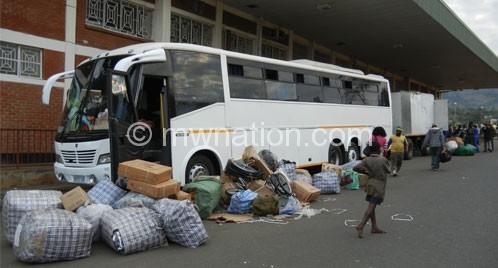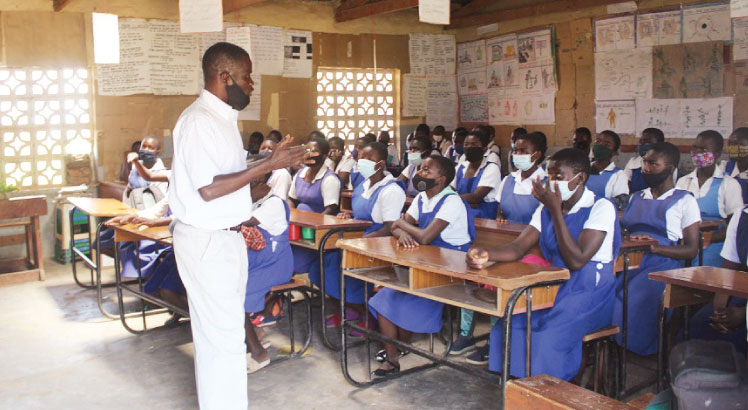Together but not united

Despite their geographical togetherness, Sadc countries continue to display disunity when it comes to intra-regional trade. As the meeting of Sadc Heads of State is underway, how is this disunity affecting the region’s dream of integration?
In Mbayani, a high density township in Blantyre City, Mernard Chirwa watches the red sun sink into the distant Michiru Hills while seated on the veranda of his one-bedroomed house. He is not a happy man.
“It is three years now since I lost my job. I have been looking for employment but nothing comes my way. How can I feed my four children, pay bills and rentals,” he says.
Chirwa used to work as a tailor at Crown Fashions, a garment producing companies in Blantyre. But in 2009, he was one of the workers laid off by the company.
“I do not know if the company is still around. We were told that our products do not have a market anymore,” he said.
Chirwa’s company is one of the many companies in the country’s textile and garment industry—a local industry that employed close to 6 000 people—that fell off due to the failure of authorities to negotiate the Malawi-Mozambique-Tanzania-Zambia (MMTZ)-Southern African Customs Union (Sacu) trade agreement.
The MMTZ-Sacu agreement, which expired on December 31 2009, allowed countries such as Malawi to export their textile and garments duty-free to the Sacu market which comprised Botswana, Namibia, Lesotho, South Africa and Swaziland—all of them Southern Africa Development Community (Sadc) countries.
At least five Malawians textile companies had, until December 2009, been exporting to the Sacu market. The companies include Crown Fashions, Knitwear Industries, Giant Clothing Limited, Win-Win Garments and Exclusive Fashions.
But with failure of the deal, Giant Clothing closed shop and over 1 000 people lost their jobs, Crown Fashions shed 500 whereas Exclusive Fashions fired 25 employees.
Sadc’s rich historical ties
One of the objectives of Sadc, as stated in Article 5 of the Sadc Treaty (1992), is to “achieve development and economic growth, alleviate poverty, and enhance the standard and quality of life of the people of southern Africa and support the socially disadvantaged through regional integration”.
The failure of MMTZ-Sacu—an agreement that arguably helped socially disadvantaged people like Chirwa to move out of poverty—is one critical juncture that questions Sadc countries’ commitment to the work together in fighting poverty through trade.
The peculiar thing to Sadc is its rich historical ties. Sadc is an amalgamation of common people spread across the region because of two historical migrations: the Ngoni and the Bantu migrations. This means Sadc is generally a region of a common people with shared culture, history and aspirations.
Yet, this historical treasure barely comes to the conscious of leaders of Sadc countries to help them compromise and agree on issues affecting the region.
In explaining the failure of MMTZ-Sacu, two years ago, Ministry of Trade and Industry spokesperson Wiskes Nkombezi told The Nation that the failure of the deal, among other reasons, was that the four countries were not ready to reopen negotiations on the issue.
“Sacu countries were not yet ready to reopen discussions on the issue because they felt MMTZ were supposed to have moved to the level where they could produce using the Sadc rules of origin regime for textiles which is a double transformation.
“Furthermore, with regards to Malawi, Sacu countries were linking the extension to Malawi’s implementation of tariff phase down under the Sadc Trade Protocol. Since the country had lagged behind in reducing tariffs as agreed, Sacu thought Malawi just wanted to be free-riders,” said Nkombezi.
Challenges of regional integration
British economist Joan Robinson details the challenges of regional integration in Sadc countries in a 1996 book titled Beggar Thy Neighbour.
Robinson argued that intra-regional distrust among countries—rooted from the history of how South Africa’s quest for economic dominance destabilised other economies—would be the critical issue that Sadc countries will face.
“The remedy of nations will be in bilateral trade deals with other regional bodies and western countries that have vested interest in Africa. This won’t help the region to move its people out of poverty. These nation need to work together,” Robinson writes.
Of course, Economics Association of Malawi (Ecama) executive director Nelson Mkandawire is calling member countries, as they meet in Lilongwe, to push for a custom union—a situation where no tariffs are charged on imports between member States, but members share a common external tariff.
But with micro-deals such as MMTZ-Sacu failing to hold the region together, can a customs union, which has bypassed its 2010 due date, be a reality?
In agreement with Robinson, Santos Alvaro, outgoing chairperson of Sadc standing committee for senior officers, said in Lilongwe last week that implementing a customs union is ‘very’ difficult in the region.
“It is very difficult to make progress on the customs union because countries belong to many organisations such Comesa and East African Community. Countries need to belong to one regional body to have the customs union,” he said.
As Robinson noted, being a member of various bodies, does, to a greater extent, reveal the Sadc member’s quest to search for various opportunities for their people in face of distrust towards their neighbours.
Free-riders
This is why these countries—wrought in infrastructural challenges and poor governance—fail to compromise and get suspicious of each other as ‘free-riders’.
This spirit is a make or break for Sadc, the heart and soul of its success and failure. Of course, as the discussions are underway in Lilongwe, the meeting has a number of issues to discuss.
For instance, Malawi, according to Nkombezi, will push for the creation of the region’s development fund to ensure the availability of resources for the financing of regional and infrastructural programmes.
“As a country, our interest is to push for the Sadc regional development fund which will improve infrastructure in the region such as the connectivity of our country to other neighbouring countries such as Tanzania, Mozambique and Zambia and in that way, facilitation of trade would be easier,” he said.
He added that Malawi’s interest at the meeting is to see the consolidation of the Sadc Free Trade Area (FTA) which, he said, aims at removing barriers to trade among Sadc member States.
However, with the key challenges still barring their fangs through the problem of MMTZ-Sacu trade agreement, the questions of effectiveness of such intentions remain murky.
This is why Ecama’s Mkandawire made sense by calling Heads of State to push for outstanding issues crippling Malawi’s trade. One way is to make sure that the region achieves unity using its geographical togetherness. It is through achieving that locals like Chirwa can be helped.





